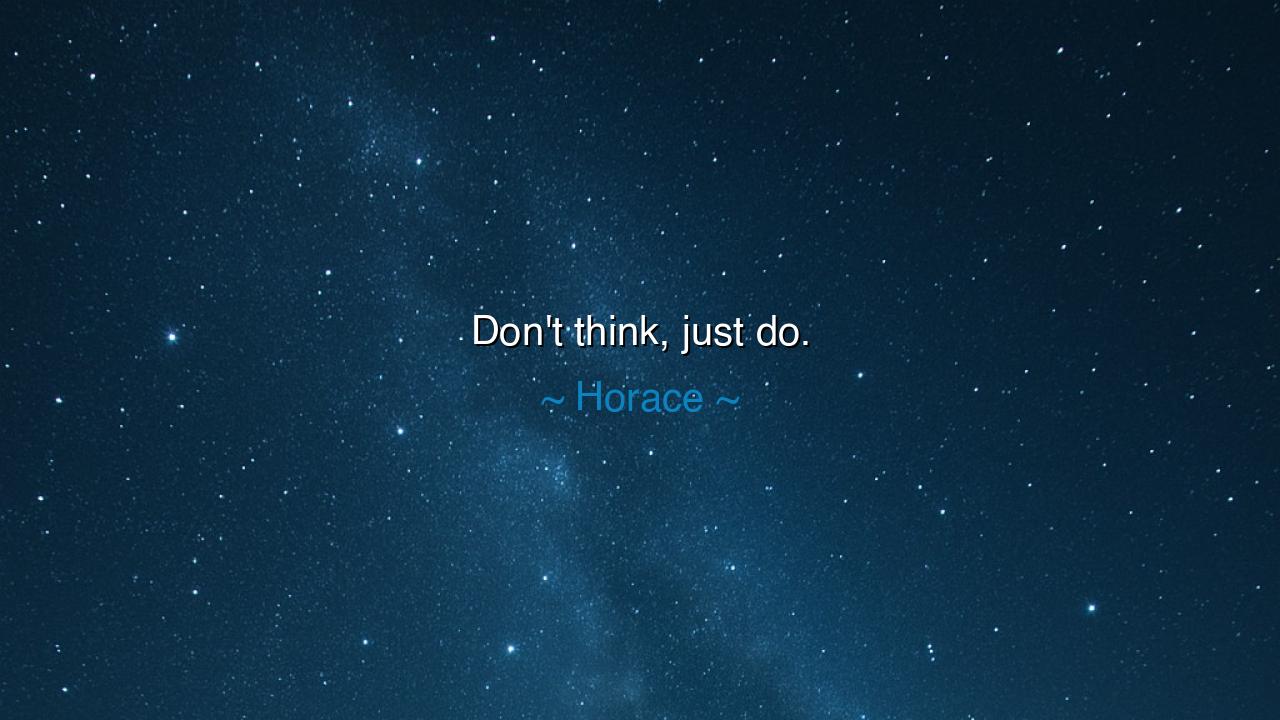
Don't think, just do.






The Roman poet Horace is remembered for many sayings of wisdom, and among them shines the command: “Don’t think, just do.” These words, though brief, carry the thunder of action and the fire of resolve. They remind us that thought, though noble, can become a prison if it is not transformed into deed. To think is to imagine, to plan, to prepare—but to do is to create, to change, to bring forth the reality of life. Horace, who lived in an age of turmoil and transformation, understood that destiny does not bow to idle thought but to decisive action.
Too many men are lost in hesitation. They think endlessly, weighing every choice, calculating every outcome, until the moment of opportunity slips through their fingers. They dream of glory but never rise from their seats; they speak of deeds but never lift a hand to perform them. Horace cuts through this weakness like a blade: do not drown in endless thought. Act. For in action, even imperfect action, there is progress. In hesitation, there is only decay.
Consider the tale of Alexander the Great. Had he thought too long on the risks of his campaigns, he would have remained a prince of Macedonia, his name lost in the dust of history. But he did not linger in fear. He crossed rivers, marched across deserts, and challenged empires with boldness. His greatness was not born of perfect thought but of relentless action. Where others hesitated, he moved—and by moving, he conquered.
History offers another witness in Joan of Arc, a simple girl who believed she was chosen to lead France in its hour of despair. She might have dismissed her visions, lost in thought, doubting her worth. But instead she acted, boldly stepping onto the battlefield, inspiring soldiers and reshaping the fate of her nation. Her deeds, not her doubts, became her legacy. In her courage, we see Horace’s wisdom embodied: don’t think, just do.
This teaching does not despise thought, for thought has its place. But it warns against paralysis—the endless circling of the mind that prevents the hand from moving. There is a time for reflection, and there is a time for decision. When the hour of decision comes, delay is defeat. Action alone opens the path forward, and in walking that path, clarity often arrives more surely than in endless speculation.
The lesson is clear: trust yourself enough to act. Do not wait for perfect certainty, for certainty rarely comes before action. Begin, and in beginning, you will find the strength and wisdom you thought you lacked. The archer does not wait for the wind to still forever—he looses the arrow, and in flight, it finds its mark. So too with life: only those who act can achieve, and only those who do can win.
So I say to you, children of tomorrow: when fear and doubt whisper, remember the voice of Horace. “Don’t think, just do.” Take the leap, seize the moment, strike the blow. Let your courage be swifter than your hesitation, and let your deeds speak more loudly than your doubts. For the world belongs not to the thinkers who never act, but to the doers who dared.
If you would practice this truth, begin today. Choose one task, one dream, one action you have delayed through endless thought. Do it now—without further excuse, without waiting for perfection. In that act, however small, you will feel the chains of hesitation break. And as Horace knew, once you act, momentum carries you forward, and destiny itself begins to yield to your will.






AAdministratorAdministrator
Welcome, honored guests. Please leave a comment, we will respond soon